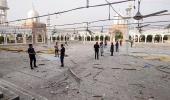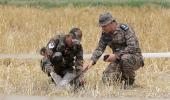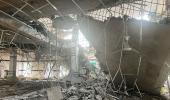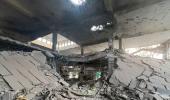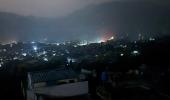'Even known names and social media handles went berserk by stating that Karachi has been attacked and an F-16 was shot down.'

'Karachi in shambles, Islamabad and Lahore bombed.'
'Asim Munir, Chief of Army Staff, arrested. Pakistan Prime Minister Shehbaz Sharif shifted from home.'
'Indian Navy completely blocks Karachi port. Balochistan is nearly free.'
If you have been fed any of the above information, then you surely must have got it off one of the Indian news television channels or following the social media handles of well-known Indian journalists on the night of Thursday, May 8.
Truth is, nothing of this kind happened.
And yet many Indians started believing such fake news in their excitement to see Pakistan being defeated in Operation Sindoor.
So what do you believe in times of war when 'truth' is the first casualty?
Moreover, how must a journalist report to ensure that he is putting out the truth and nothing else?
Syed Firdaus Ashraf/Rediff asked Nitin Gokhale -- journalist and national security expert -- for his insights.
Nitin has covered conflict zones in the North East and the Kargil War of 1999. His news reports were always accurate and shorn of speculation. He adhered to factual reporting when he wrote for print, the web or later in the broadcast medium.
The first casualty in war is truth. Does 'fake news' on some Indian news television channels in anyway help demoralise and defeat the enemy?
Not really, it demoralises or gives a false sense of superiority that does not last too long.
The news channels are going overboard, especially with what happened on May 8. It lowers the prestige and credibility overall.
Even known names and social media handles went berserk by stating that Karachi has been attacked and an F-16 was shot down. It was madness, which is regrettable.
This is unacceptable to old-fashioned fellows like me. People do not take India seriously with what happens in our news channels and studios.
As a journalist, how does one sift the chaff from the grain, separate truth from fiction? In other words, how does one counter the fog of war?
There are basic principles of journalism that were taught to us. Check, cross-check, double-check and check. This is extremely important.
The second point is, 'when in doubt, cut it out'.
These two journalism principles have been ingrained in my mind since I started working as a journalist in 1983. It has never gone out of my consciousness.
I don't understand why this journalism principle is not being applied by journalists. I am not saying these principles are to be followed by the common man who depends on WhatsApp and other social media accounts for daily information. I am not calling this information as news.
Journalists need to wait for confirmation even if it is exciting news.

On Thursday even veteran Indian journalists goofed up and did not confirm any news. They just started ranting on social media or went ahead and telecast incorrect news about India's attack on Pakistan.
It is the pressure of rival news channels.
I was on a news channel, Lallantop, and the anchor kept on pressing me what happened in Karachi. What about Pakistani jets JF-17s being shot down?
I said on his channel that I have no information and I cannot confirm.
I was then asked what about the Pakistani pilot being arrested? What happens to him if he is caught? What is the convention?
I said that answer I can give you. Suppose a Pakistani air force pilot has been caught, there is the Geneva Convention which needs to be applied. I explained that.
And let me clarify, I am not sitting in judgement.
I want to suggest and not advise the media, that if you want to retain your credibility with the government or the public, then please be credible, be responsible.
The responsibility is on journalists, no matter what the pressure is (to deliver quick news).
Who does the fog of war help, really?
I don't know.
What is the purpose of doing all this? Is it the enmity and hatred for Pakistan as a nation? It is understandable because the Pakistan army lets terrorists flourish under their very nose.
I would also like to see the Pakistani army being punished. But is that the reality happening? Was it the truth? The answer is, no. That was not happening (on May 8 night). It was just attack by drones which India countered. India later counter-attacked.
If news channels had stated this fact people would have believed them.
Now, if genuine war breaks out, then it is like crying wolf. People will not believe the media straightaway.
This question the owners, the news anchors and investors in news channels must ask themselves.
Poor reporters on the field are always under pressure because some rival channel has already put out the news. So, now they have to go one up. They have to constantly feed the insatiable hunger for excitement, for over the top information.

How then do you get confirmation of news even if it is from sources? Should we need to telecast or report news even when things are not confirmed?
You can't, and you wait.
The problem here is the responsibility begins at the top with editors. They must be willing to give time to their reporters to confirm the news from their sources.
Earlier we journalists used to say if one source is telling you it is probably due to some vested interest. So confirm it, only then we will put it out OR unless you know the source very well and have trusted that source in the past.
But the luxury of waiting to confirm before putting out the news is no longer given to the field reporters. This is the reason we saw the (news) mayhem on Thursday night.
During the Kargil war we found the government was proactive in giving out information. Unfortunately, this time verified information is hard to come by, with even the government saying that it's too early to confirm/deny news.
What does a journalist do?
There is a difference between Kargil and now. There are too many people to satisfy for information.
Actually, if you ask me the Government of India is playing on the front foot.
In the Western media, earlier our ambassadors never had chance to go to big media outlets like CNN, Fox News in the USA and Sky News in the United Kingdom.
This time both our diplomats in the US and UK have appeared on big prime time programmes. They have been very upfront and strong in India's defence in the India-Pakistan conflict by stating that Pakistan is the perpetrator of terror.
When Operation Sindoor started the government has been giving out the information on how the nine targets in Pakistan were selected and what they did. This is how things pan out.
Even in the Kargil War, they had daily briefing in Delhi, if you recall. Moreover, the Kargil War was a long drawn, 45-day, conflict. I reported from there and you had something or the other to report every day. So there was no question of false news or unverified news. That was a different context.
